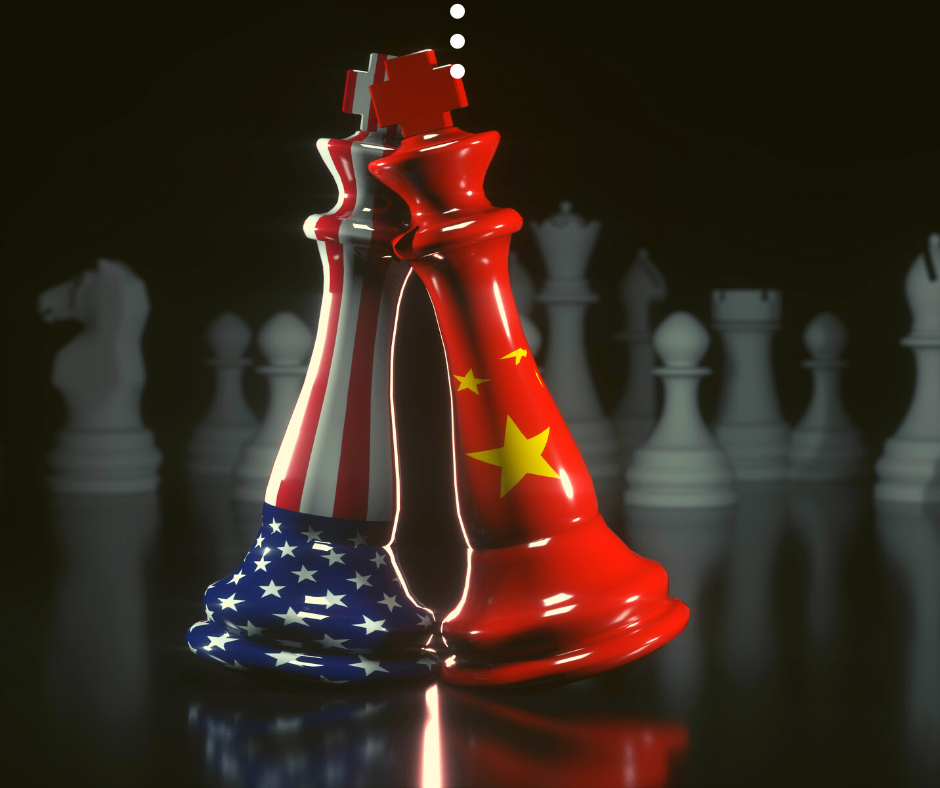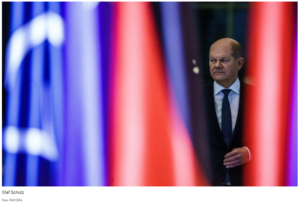Global Sino-American rivalry in the context

The Russia-Ukraine war fits into the broader context of the new rivalry between the superpowers in the multipolar world that has been developing for over a decade. Despite Moscow’s challenge to the West, the date of February 24 does not mark the beginning of a new “cold war” as we know it from the time of the US-Soviet competition. Russia is not a superpower outside of its arsenal of nuclear weapons, and its economy is smaller than Canada’s. The greatest strategic challenge to the lasting supremacy of the United States in the international arena is the dramatic rise of China as it is an ally of Russia.
Washington’s rivalry with Beijing is multifaceted and takes place, among others, in the military and new technologies sphere, in space, and in geostrategic terms, both in Asia and in the Middle East and Africa. It also reaches Europe and Latin America. Many countries do not want to side with any of the rival powers. A more favorable position seems to be the diversification of alliances and thus an attempt to strengthen one’s own strategic position or to obtain economic benefits.
Nations of Asia, the Middle East and Africa are also aware that Russia, bound by an informal alliance with China, is still a trans-regional power with the ability to project power not only in its immediate neighborhood – what is currently taking place during the armed confrontation between Moscow and Kiev. The Kremlin is also able to carry out military interventions outside its region, as evidenced by Russia’s participation in the Syrian war on the side of Bashar al-Assad. In addition to purely military aspects, this is possible thanks to the rich resources of raw materials, especially gas and oil. The global energy crisis that erupted during the Covid-19 pandemic has been further exacerbated by Russia’s invasion of Ukraine. Despite harsh sanctions, high gas and oil prices fuel the Russian war machine financially which is also boosted by Russia’s participation in the OPEC+ club that regulates oil production so as to maintain oil prices favorable for producers. All these circumstances affect the calculations of developing countries, countries of the global South, but also political and economic decisions of regional powers.
ASIAN INTERESTS OF WASHINGTON AND BEIJING
Since the Barack Obama administration, there has been a shift in Washington’s long-term focus towards its interests in the Western Pacific. The key element of the implementation of this strategy was the idea of the Trans-Pacific Partnership (TPP), i.e. an intercontinental trade deal between 12 countries of the Pacific Ocean, the driving force of which was to be the United States. One of the goals of the TPP was to outflank China and thus hinder the expansion of that Asian power. However, US President Donald Trump withdrew his country from the agreement, and – as a result – it lost its significance. Meanwhile, China pursued its own global expansion projects, with the Belt and Road Initiative (BRI) playing a leading role until the outbreak of the Covid-19 pandemic. At the regional level, Beijing uses its membership in the Regional Comprehensive Economic Partnership (RCEP) that was initiated by ASEAN (Association of Southeast Asian Countries) and also includes Japan, India, South Korea, Australia and New Zealand. China’s partnership with these countries is not easy due to both sea and land border disputes (with some ASEAN countries, Japan and India) and the network of alliances that Washington has been building in the region for decades.
After the trade war broke out between the US and China in 2018, the Indo-Pacific nations have been trying to navigate between the regional interests of the two powers, which is becoming increasingly difficult as the systemic rivalry between Washington and Beijing intensifies and efforts from first – the Donald Trump administration, and then Joe Biden aimed at decoupling the world’s two largest economies. However, economic warfare is only one dimension of the long-term competition between the US and China. In a situation where maintaining or losing the hegemonic status (USA) or significantly increasing influence (China) is at stake, both Washington and Beijing are trying to strengthen old and build new alliances in key regions of the world.
“XIPLOMACY” AND THE GREAT GAME FOR INFLUENCE IN THE MIDDLE EAST
The war in Ukraine also demonstrated the complex nature of the geopolitical setting in the Middle East as there too the rivalry between the United States and China is increasingly visible. Beijing is not an alternative to the Gulf monarchies able to replace lasting partnership with Washington. However, Saudi Arabia and the United Arab Emirates see China as a new global source of power and, above all, a key economic partner in the energy sector. Therefore, for Saudi authorities the recent visit of Chinese leader Xi Jinping and the first China-Arab summit (December 7-10, 2022) was an opportunity to show that their country remains a “trustworthy and credible” partner for Beijing.
Xi Jinping announced a “new era” in China’s relations with Arab nations, indirectly referring to the ties that connect this region with Washington. In his speech at the Riyadh summit, the Chinese leader stated that the Arab countries “should remain independent and defend their common interests. China supports the Arab states in finding their own paths of development independently, adapting them to local conditions”. This is a kind of Beijing’s commentary on the position of Saudi Arabia in particular but also the United Arab Emirates towards the Kremlin, and of China itself too, after Russia’s invasion of Ukraine. Washington has unsuccessfully pressured those countries to side with the West and break their cooperation with Moscow within OPEC+. The very visit of President Joe Biden to Saudi Arabia in July this year not only did not bring any constructive effects for Washington’s strategic interests but also with its modest setting strongly contrasted with how the Chinese leader Xi Jinping was received in Riyadh. Relations between the two leaders: Joe Biden and the Saudi crown prince, Mohammed bin Salman, are not easy due to the conflicting energy interests of both countries (especially since the outbreak of the Ukrainian war), because while Washington is seeking to increase oil production and lower its price, the Saudis – just like Moscow – want to keep hydrocarbons’ prices high. The second factor contributing to the colder ties between the two nations compared to the previous – Donald Trump – administration is the criticism voiced by Joe Biden towards the crown prince in connection with the death of journalist Jamal Khashoggi at the Saudi consulate in Istanbul in 2018.
It seems that Saudi Arabia finds in Beijing a promising partner, and most importantly, the second and perhaps soon the largest economy in the world, and an emerging superpower with which it can boost its regional and global standing. Warmer relations with Beijing are also a way for the Saudis to increase their bargaining power in relations with the US administration.
In the Chinese narrative, the Arab states and Beijing share not just economic interests, but also a similar approach to international relations. This applies to their commitment to and the principle of “non-interference in the internal affairs of other states”. In this context, remarkable was the fact that President Xi stated that both sides “will strongly support each other in protecting sovereignty and territorial integrity.” This expression – quite common for the official Chinese phraseology – has acquired a special meaning after Russia’s attack on Ukraine. On the one hand, Beijing emphasized its attachment to the principle of equal sovereignty of UN member states and their territorial integrity contained in the UN Charter, and – on the other hand – openly proclaimed that the alliance with Moscow “has no limits”.
The Belt and Road Initiative, launched in 2013 and slowing down somewhat as a result of the Covid-19 pandemic, also extends to the Middle Eastern region. However, this is not the only project of the Chinese leader in which Arab countries participate. They were also invited by Beijing to participate in two other flagship projects of Xi Jinping: the Global Development Initiative (GDI) and the Global Security Initiative (GSI). Both were discussed at the Riyadh summit. The GDI was first announced by Xi Jinping at the UN General Assembly in September 2021 and includes, among others: cooperation projects on poverty reduction, food security and industrialization. However, both projects offer an alternative to the US-dominated economic and strategic world system. Xi Jinping himself described the GDI in the specific phraseology of the Chinese diplomacy as “an alternative model for achieving sustainable, coordinated and inclusive growth while meeting the UN Sustainable Development Agenda by 2030.”
On the other hand, the Global Security Initiative (GSI) was proposed also by Xi already after Russia’s invasion of Ukraine – in April 2022, during the annual Boao Forum for Asia, and can be interpreted as a challenge to the current security architecture and international order with the United States as the only superpower. The very concept of the GSI is still vague, apart from Beijing’s characteristic references to the United Nations Charter, the peaceful resolution of disputes between countries in dispute, and the maintenance of common, comprehensive and lasting security based on cooperation. However, the timing of the announcement was remarkable, as were Beijing’s efforts to include the rich countries of the Gulf and other Arab League nations into the GSI format.
The region is important to China both in economic and strategic terms. The value of China’s trade with the Arab world amounted to approximately USD 330 billion in 2021, an increase of 37 percent compared to 2020. Trade with Saudi Arabia alone reached USD 87.31 billion during the same period. Deals on cooperation under the Belt and Road were signed with Beijing by both the Arab League and 20 Arab states, which – according to Chinese data – led to the joint implementation of 200 projects, including in the field of energy and infrastructure. It is worth noting that one of them is the Lusail Stadium in Qatar’s capital Doha, with a capacity of 80,000 seats, famous for this year’s football world cup.
All the mentioned initiatives and projects are described by the Chinese government as elements of “Xiplomacy” – Xi Jinping’s original style and program of cultivating relations with other countries. The double summit that took place during the Chinese leader’s visit to Saudi Arabia on December 7-10, 2022, also fits into this context. The talks brought investment deals worth USD 50 billion. Most of all, however, Beijing is pushing for oil and gas trade to take place in yuan – the Chinese currency. This is a long-term Chinese strategy related to the rivalry with Washington, aimed at strengthening the global standing of China and its currency, and thus weakening not only the dominant role of the US dollar, but also that of the United States itself. Of course, this works also for Moscow because in the long run it would make it easier for Russia to trade with the world, even with the persistence of Western sanctions.
COMPETITION FOR AFRICA
The US response – almost immediately after the Sino-Arab Summit – was the US-Africa Leaders’ Summit, held in Washington, D.C. December 13-15, 2022. The last such meeting took place during the presidency of Barack Obama in 2014. The initiative was then skipped by the previous US administration of Donald Trump. China, on the other hand, has developed a format of regular meetings, which is FOCAC, i.e. the Forum for China-Africa Cooperation. The United States, concerned about Beijing’s diplomatic and investment expansion in Africa, is trying to convince the countries of this continent that now they are a priority for Washington. 49 African leaders attended the meeting with President Joe Biden. An important issue raised at the Washington Summit was food security that has become extremely pressing since the disruption of supply chains as a result of the Covid-19 pandemic, and then the Russian invasion of Ukraine has exacerbated the problem even more. A large number of African nations depends on grain and fertilizer imports from Russia and Ukraine. The Russian blockade of the Black Sea ports has cut off the supplies for the most needy African countries, leading to shortages and huge price increases, which also threatens the region’s internal stability.
This situation may further increase Africa’s dependence on China that for more than a decade has been investing on the continent on a large scale and providing significant loans to African countries, although in recent years a downward trend can be observed in this respect. China’s “expansion” in Africa is criticized by the American authorities who accuse Beijing of driving the poorest countries of the region into a “debt trap”. Beijing rejects these allegations, pointing out that “China has financed over the years the construction of more than 10,000 kilometers of railways, nearly 100,000 kilometers of highways, 1,000 bridges and 100 ports, as well as countless large energy facilities, hospitals and schools in Africa.” All this, according to the Chinese authorities, “contributed significantly to the continent’s development and benefited the local population.” As for China’s financing of infrastructure investments in Africa and loans, there are also arguments – also in Africa itself – that they help to deal with the financing deficit by Western countries and international institutions. Undoubtedly, President Biden – unlike the Chinese leader – cannot offer Africa large state investments and loans because he is dependent on Congress in this respect. First of all, investing is not done by the government, but by private American companies. The president can encourage American businesses to become more involved in Africa while offering assistance in key areas: new technologies to better deal with the climate challenges that are increasingly plaguing the African continent and its agriculture, and health solutions, necessary in times of pandemic and regularly recurring local epidemics. It is worth noting that the United States – unlike China – considers the promotion of democracy, human rights and civil society as one of its priorities in Africa. The Joe Biden administration gives these values a special importance, and in Africa it is a big challenge due to the weakness of state institutions that results both from the colonial past and decades of economic hardship.
EFFECTS OF THE GLOBAL SINO-US COMPETITION. OPPORTUNITIES FOR EUROPE.
For developing countries, a bigger involvement of great powers may be a single positive result of the global rivalry between Washington and Beijing. This has been evidenced by the recent Africa-US summit, brought back to life after almost a decade. Xi Jinping’s meeting with leaders of the Arab nations seems to follow the same trend. In addition to the rich Gulf countries with which Beijing conducts extensive trade and investment projects, less wealthy Arab nations were also present there. However, it is hard to assess to what extent those developing countries, both in Africa and the Middle East, can benefit from the increased involvement of the USA and China. There is a question mark whether they do not just bring the necessity of an “exclusive” relationship with one of the two superpowers, or even larger debt or difficulties with receiving loans from international institutions. However, this is an opportunity for the European Union. Smart development cooperation – with Africa in particular – may in the long term contribute to the construction of stable, transparent institutions necessary for an inclusive economic growth there. At the same time, it is a necessity for Europe, given the demographic potential of Africa and the directions of possible mass migrations.
author: Bruno Surdel, PhD, analyst, Centre for International Relations
[evc_interactive_banner type=”classic” custom_link=”url:https%3A%2F%2Fmastersandrobots.tech%2F|||”]




